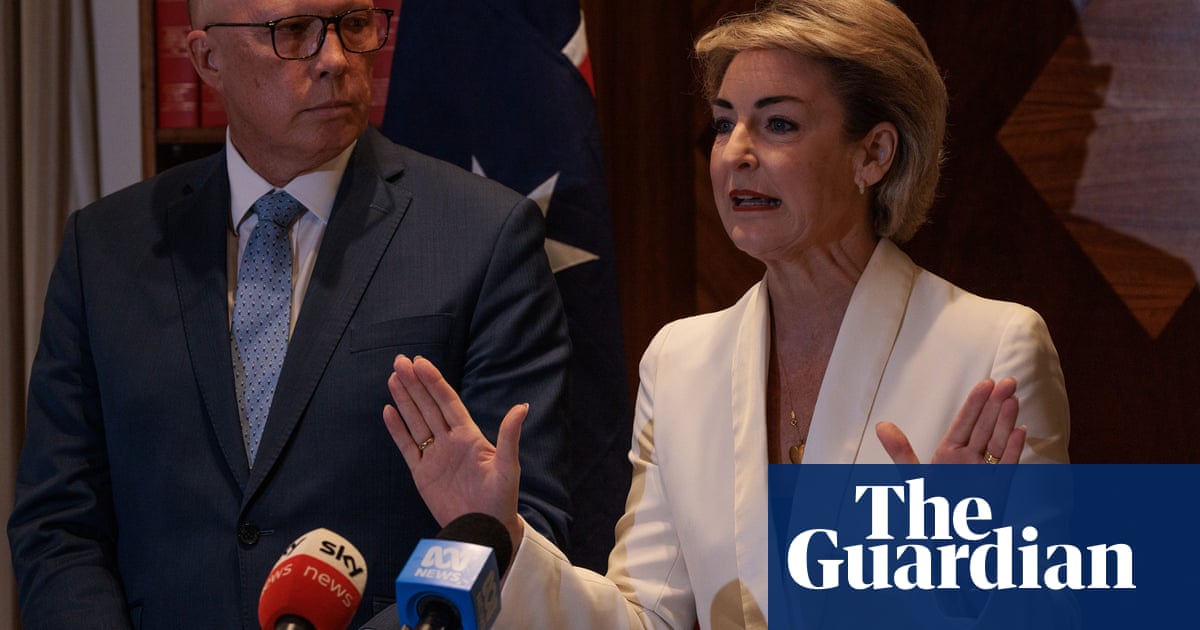Leading mental health experts have raised concerns over the Coalition’s plans to repeal “right to disconnect” laws, arguing that backtracking will have various negative consequences for employee stress and burnout.
The world-leading legislation,passed in early 2024, allows Australian workers to refuse to monitor, read or respond to work communication outside paid hours, unless doing so is unreasonable.
Winding back the reforms would be a “regressive step”, said Prof Sam Harvey of the Black Dog Institute. “We’ve come a long way to understand how important these things are in mental health. Rolling back the legislation would be a problem,” Harvey said.
The reform passed as part of an industrial relations bill, opposed by the Coalition, which criticised Labor over a rushed process – exacerbated by a last-minute discovery thatthe bill inadvertently allowed criminal penaltiesfor breaches, which was quickly amended.
The industrial relations minister, Murray Watt,said last yearthe laws aimed to address workers having to take “constant calls or constant emails with an expectation that they’re going to be monitoring and responding, when they’re not getting paid to do it”.
Union groups backed the change, put forth by the Greens as part of complex negotiations, while business groups said it wasunnecessary and could lead to job losses. The Coalition argued it would create “confusion and uncertainty” and reduce the ability for workplaces to have flexible working arrangements.
Peter Dutton has vowed to repeal the right to disconnect, a position recommitted to by the shadow IR minister, Michaelia Cash, two weeks ago. On 12 April, at a press conference with Dutton, she claimed the change was “costly, it is confusing and … complex”.
Sign up for the Afternoon Update: Election 2025 email newsletter
In a statement, Cash said the Coalition would consider any evidence that mental health protections for workers should be expanded, but claimed the changes had led to some employers having to work extra hours themselves.
“There have long been protections against unreasonable overtime in the Fair Work Act, which we support. Employers also already have obligations to protect the health and safety of their staff, including their mental health. These obligations will continue,” she said.
Prof Patrick McGorry from the mental health organisation Orygen, who has endorsed the mental health policies of both major parties at this election, backed the right to disconnect laws for ordinary workers.
“You’ve got to look after yourself. If you can’t switch off, it will affect your mental health,” he said. “For most workers it’s not necessary for them to be available and work beyond the hours … If there is a need to contact people outside working hours, that should be formalised and they should be paid.”
McGorry said arrangements should be different for executives or senior staff, who were better-compensated than ordinary workers and therefore needed to be more flexible, but that it should be a conversation inside workplaces. “If people are forced or required to always be ‘on’, that’s not good for many people,” he said.
Prof Ian Hickie, from the University of Sydney’s Brain and Mind Centre, said the laws helped create better work-life balance. He said laptops and smartphones, as well as the work from home shift, saw people often working longer hours at home before or after their rostered shifts.
Sign up toAfternoon Update: Election 2025
Our Australian afternoon update breaks down the key election campaign stories of the day, telling you what’s happening and why it matters
after newsletter promotion
“The right to disconnect is an important piece of legislation,” he said.
Hickie said he would “absolutely” have concerns if the law was repealed.
Harvey said researchers were identifying increasing levels of poor mental health among young workers in Australia. While the root cause was not yet certain, he said one hypothesis was the further extension of work into home life.
“It’s very hard to get away from work. Mobile phones, emails, social media can follow you everywhere. What we know is people having a chance to disconnect from work … like office workers getting a chance to switch off, is important,” he said.
In a statement, Watt stood by Labor’s reform.
“The right to disconnect changes made during the last term are already having a big impact on the lives of millions of workers. Uninterrupted time for yourself, with your partner and with your children is vital not only to be happier, but also helps employers with worker retention,” he said.
In Australia, support is available atBeyond Blueon 1300 22 4636,Lifelineon 13 11 14, and atMensLineon 1300 789 978. In the UK, the charityMindis available on 0300 123 3393 andChildlineon 0800 1111. In the US, call or textMental Health Americaat 988 or chat 988lifeline.org
